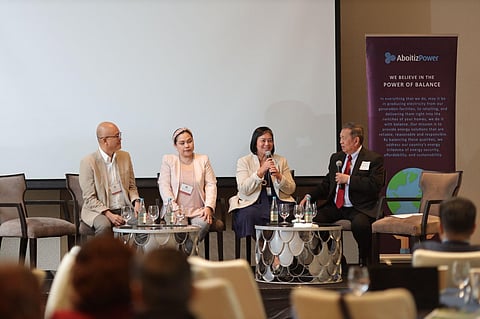
- HEADLINES
- NEWS
- PAGE THREE
- COMMENTARY
- BUSINESS
- LIFE
- ACTION
- GLOBAL GOALS
- SNAPS
- DYARYO TIRADA
- MORE

Amid the energy transition frenzy, listed Aboitiz Power Corp., or AboitizPower, recognized a growing scarcity of skilled power industry workers.
It is thus necessary to develop a workforce that can adapt and implement energy security, affordability, and sustainability.
"There has to be a workforce now and in the future that will keep our energy system functioning and serve the needs of our country," AboitizPower chief people officer MaLu Inofre said.
"Among our most difficult challenges is building a skilled talent pipeline that can effectively adjust and work with the fast-paced transformation within the industry's energy mix, digital systems and regulations," she said.
Power forum held
"It has become exceedingly vital to ensure that workforce skills align with the changes of the times," she further explained. "In the same way, attracting talent in a competitive global market is crucial to a sustainable, efficient, and innovative Philippine power sector that meets our country's growing energy demands and sustainability objectives."
Inofre made her remarks during the first Philippine Power Industry HR Forum at Shangri-La The Fort, Taguig City.
The event was presented by the American Chamber of Commerce of the Philippines Inc., or AmCham, in partnership with AboitizPower.
In the Philippines, the Department of Labor and Employment said that an estimated 1 million skilled workers in engineering, architecture, and construction are lacking.
They cited "Power Plant Maintenance Engineer" and "Maintenance/Powerplant Engineers" as among the most challenging occupations to fill up.
This can be due to a lack of qualified applicants or brain drain (or when better opportunities abroad are taken advantage of by skilled locals).
"Between 2016 and 2021, the employment in the power industry declined by 15,444 individuals," said DoLE Bureau of Local Employment Director Patrick Patriwirawan Jr. during the same event.
"The Philippines saw an increase in the employment in the renewable energy industry last year but could have employed more if not for the delays caused by the Covid-19 pandemic on various project developments in the sector."
Inofre added that a major factor influencing the labor shortage is the shift in the type of skills sought by employers, especially as the sector tries to balance the entry of renewable energy whilst maintaining traditional energy systems.
"Knowing this, upskilling will be key to facilitating a just transition for those who will be affected by the transition to a greener economy, as well as the new generation of workers. It is imperative that we successfully cultivate both thermal and renewable energy, so that we can ensure reliable and affordable energy supply for the country," she said.
Meralco Power Academy program management director Engr. Marc Lester Malibiran explained that, on top of upskilling the workforce, the industry should also help develop interest for the sector, especially in the youth.
"The Philippines boasts a young and vibrant population, brimming with innovative potential. By investing in talent development, we tap into this dynamic workforce, harnessing their fresh ideas and energy," he said. "Unfortunately, we are seeing a decline in both take-up and completion of STEM (science, technology, engineering and mathematics), averaging only a 21 percent completion [rate]."
Intimidating STEM
"Young Filipinos avoid STEM as it is seen to be an intimidating course of study. This is important to know as this signals us to develop programs that remove this preconceived notion," he added.
Young academic and professional achievers were recruited and trained by AboitizPower to operate, monitor, and control the company's National Operations Control Center, which oversees over 20 renewable energy facilities spread across the country all from one central location.
The forum served as an avenue for human resources professionals in the Philippine power industry to connect, collaborate, and communicate ideas, knowledge and best practices.
Sentiments from the breakout sessions revealed that skills and competency gaps or mismatch, a limited external talent pool, and difficulty in retaining talent due to global and local competition are the most cited challenges in the human resources field of the energy sector.
